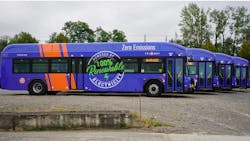TriMet’s climate health initiatives help improve environment
Over the past year, TriMet says it has taken major steps to reduce its carbon footprint and overall impact on the environment.
The switch to solar, wind and other renewable energy sources, along with the move to renewable diesel in buses, has helped the agency on the path toward reaching a nearly 70 percent reduction in greenhouse gas emissions in a year’s time.
TriMet’s Board of Directors will vote on a resolution April 27 authorizing a contract with Bretthauer Oil Company for R99 renewable diesel for the LIFT paratransit and WES commuter rail vehicles. This is the same type of fuel TriMet began using in fixed-route buses last December. A separate resolution will allow for the purchase of 24 battery-electric, zero-emission buses from manufacturer GILLIG. Also this month, TriMet updated and submitted its Climate Action Plan to the Federal Transit Administration (FTA) as part of its Sustainable Transit for a Healthy Planet Challenge.
While the long-term plan is to cut TriMet’s emissions down to net zero by 2050, the recent and upcoming initiatives are important steps and will help TriMet make an immediate impact. A 70 percent reduction in emissions is equivalent to taking around 19,000 automobiles driven for one year off the road, according to the Environmental Protection Agency. It would also clear the air of around 193 million pounds of greenhouse gas emissions.
So, for this Earth Day, at a few transit centers, riders will be able to get an up-close look at some of the battery-electric buses. TriMet staff will also be there handing out tree saplings, an Earth-friendly present for riders to keep or plant somewhere in the community.
2021: A year of environmental milestones
This last year has seen TriMet take some major actions to address the health of the climate. Since June 2021, all MAX trains, the latest electric buses and all TriMet-owned facilities run on renewable electricity, a move made possible through PGE’s Green Future and Pacific Power’s Blue Sky programs. That change followed a 2020 analysis, which found that the electricity TriMet used accounted for the agency’s second largest source of carbon dioxide emissions behind only the bus fleet.
Then, in December 2021, the agency ditched biodiesel in favor of renewable diesel for the buses. Renewable diesel comes from sustainable organic matter like natural fats, vegetable oils and greases. It produces fewer emissions, resulting in a cleaner, low-carbon fuel.
Known as R99 for how it’s derived from 99 percent renewable sources, it replaced the B5 biodiesel blend TriMet had been using since 2006. Renewable diesel is chemically identical to petroleum, but it contains nearly no fossil carbon and performs better in cold air. This has the added benefit of reducing maintenance costs by an estimated $100,000 a year.
Targeting zero emissions
The second fleet of five long-range electric buses went into service last year. This came after the agency had some success with its first batch of five short-range battery electric buses in 2019. Next up in 2023, TriMet will move on to purchase 24 battery-electric buses. These are all important steps as the agency transitions to a 100 percent zero-emissions bus fleet by 2040.
These future steps also include:
- Purchasing electric vehicles for supervisors and maintenance crews to use.
- Implementing an equity lens for future projects and service planning, which will take into account carbon reductions.
- Performing annual carbon inventory updates to track progress toward emissions reductions.
